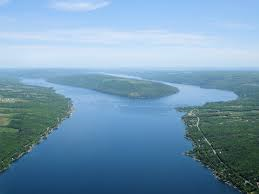Cognition
It Takes a Lot to Plant and Harvest Meaning
The long view of life's meaning often begins when there is nothing much to see.
Posted April 25, 2014

The sign at the bottom of the hill says Domaine Leseurre Winery. Half way up the hill sits a small, unassuming, yellow, frame building overlooking Y-shaped Keuka Lake, one of the jewels of New York’s Finger Lakes Region. Recommended to us by a neighboring winery, my wife and I scale the steep drive knowing little more about the winery than it is owned by a French couple. The acreage in front of the tasting room (which doubles as a home) is bare, still being cleared. Behind the building the land is dotted with tree stumps. As yet, there is no evidence of grapevines, so ubiquitous in the Finger Lakes.

We stand at the entrance and look down the hillside to the lake, blue in early spring, a single boat in the distance, steep hills on the opposite shore, trees still barren yet ready. “We didn’t even know we had a view,” says Celine Leseurre, one of the owners, with a lilting French accent. While pouring samples of their excellent wines, she explains that they are clearing the land by hand because back-hoes might damage the soil in permanent ways, so delicate a process is the growing of grapes. Her husband, Sebastien, pops in briefly, welcomes us, speaks with his wife so fast that my high school French doesn’t stand a chance. Sebastien is from the Champagne region and Celine is from the Pyrenees in southwestern France. They met in New Zealand and married in the U.S. Between them, they have traveled to thirty-two countries learning the fine art of wine making. In 2011 they put down roots in Keuka Lake. Buying the finest grapes from the region, they are already producing wonderful wines, but, to date, they have not planted their first grapes.
Celine explains planting will come soon. She says, though, that it may take ten years, even twenty, for the vines to mature, for the wine to be ready. She smiles, “In a way we are doing this for our children.” It is a lifetime commitment.
It her short story “Face,” Alice Munro says, “In our life there are a few places, maybe only one place, where something has happened. And then there are other places, which are just places.” Celine and Sebastien have found that “place” where “something has happened.” Though it is far from their original home, country, language, culture, it is the place where they feel their dreams quickening.

It is the place where they look at an empty hillside and envision something lush, where they see children growing to adulthood, and themselves living to old age. In essence, it is a place where they will plant and prune, grow and harvest meaning.
As we listen to Celine talk about their plans, I think about the courage it takes to plant one’s flag and say, “This is the place. Here is where we will make our lives.” Courage because no one ever knows what will come. And yet, without staking one’s claim, there is a chance that nothing, be it good or bad, will ever come. Paul Tillich, the philosopher and theologian, called this the “courage to be.” It is the capacity to embrace “being” in spite of “nonbeing,” or as I would say, to bring hope to not-knowing.
David B. Seaburn is a novelist. Learn about his other writing by clicking on “more…” under his picture above.


